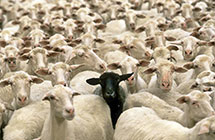替罪羊(scapegoat)、败家羊(black sheep),为何英语中背锅的总是羊
|
英语中把代人受罪、替人“背锅”的人称为“scapegoat”,意思就是替罪羊,把家族中有辱门第的成员称为“black sheep”,相当于中文里的败家子、害群之马。可你知道为什么替罪的、败家的偏偏是羊,而不是猫、狗、猪、牛或者其他动物吗?
Scapegoat 例句: I don't think I deserve to be made the scapegoat for a couple of bad results. The word scapegoat was first coined by English Protestant scholar William Tyndale in his 1530 English translation of the Bible, according to a book written by David Dawson. Tyndale, who was deciphering Hebrew descriptions of Yom Kippur rituals from the Book of Leviticus, recounted a ceremony in which one of two goats was selected by lot. A high priest would place his hands on the goat’s head and confess his people's sins— thus transferring them to the animal—before casting it out into the wilderness to rid Israel of its transgressions. As for the other goat, it would be sacrificed to the Lord. Tyndale coined the word scapegoat to describe the sin-bearing creature, interpreting the Hebrew word azazel or Azazel as ez ozel, or "the goat that departs or escapes." That said, some scholars have disagreed with his interpretation, claiming that Azazel actually stands for the name of a goat-like wilderness demon, whom the offering was meant for, or a specific location in the desert to where sins were banished, often thought to be a mountainous cliff from which the scapegoat was cast off and killed. Over the centuries, the word scapegoat became disassociated with its Biblical meaning, and it eventually became used as a metaphor to describe a person who shoulders the blame of any wrongdoing. 至于black sheep,如果你以为是“黑色的绵羊”,那可就大错特错了。 Black sheep 例句: As the owner of the factory I'm like the head of a family, and as such I can't allow any black sheep among my employees. In the English language, black sheep is an idiom used to describe an odd or disreputable member of a group, especially within a family. The term stems from the genetic effect in sheep whereby a recessive gene occasionally manifests in the birth of a sheep with black rather than white coloring; these sheep stand out in the flock and their wool was traditionally considered less valuable. Black wool was considered commercially undesirable because it could not be dyed. In 18th and 19th century England, the black color of the sheep was seen as the mark of the devil. In modern usage, the expression has lost some of its negative connotations, though the term is usually given to the member of a group who has certain characteristics or lack thereof deemed undesirable by that group. |









